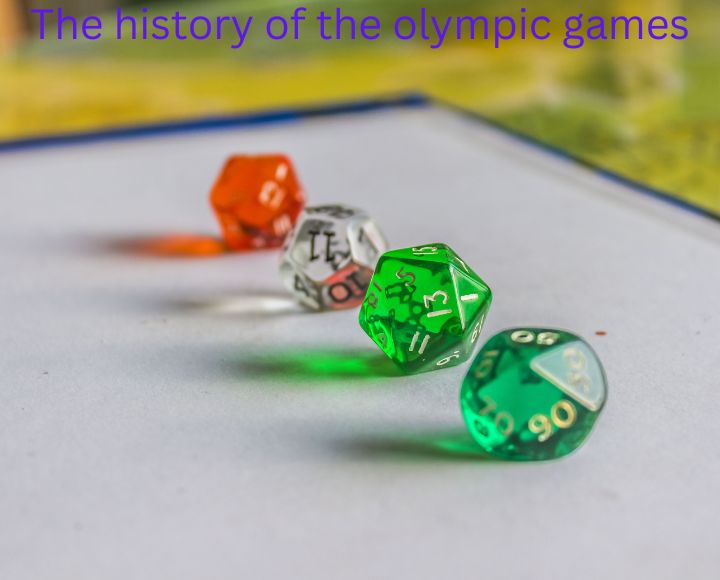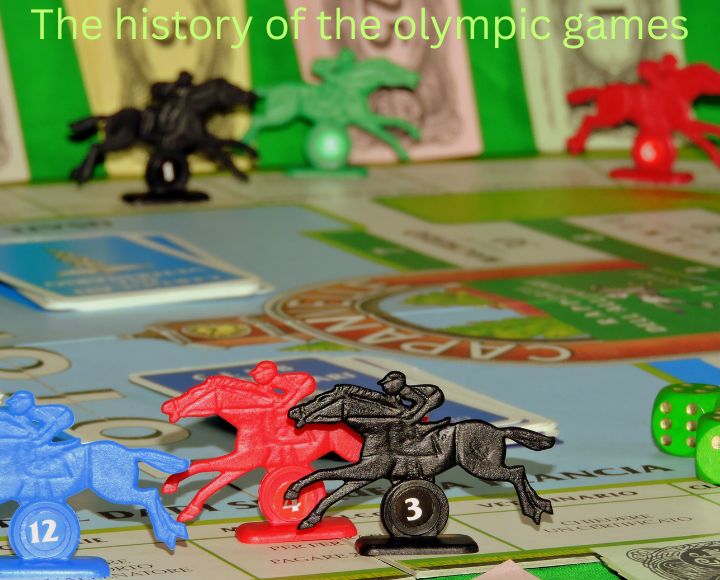The history of the Olympic games
 The Olympic Games have a storied past that stretches back over two thousand years. From its humble beginnings in ancient Olympia to the global spectacle that it has become today, the Olympic Games have always represented the pinnacle of sporting achievement. This article, titled ‘The History of the Olympic Games: A Glimpse into Sporting Greatness’, takes you on a journey through time, exploring the origins, evolution, and significance of the Games.
The Olympic Games have a storied past that stretches back over two thousand years. From its humble beginnings in ancient Olympia to the global spectacle that it has become today, the Olympic Games have always represented the pinnacle of sporting achievement. This article, titled ‘The History of the Olympic Games: A Glimpse into Sporting Greatness’, takes you on a journey through time, exploring the origins, evolution, and significance of the Games.
Ancient Olympic games origins and traditions
The ancient Olympic Games, which began in 776 BC, were a religious and athletic festival held in Olympia, Greece. The Games were dedicated to Zeus, the king of the gods, and were held every four years as part of a larger religious festival known as the Olympiad. The events in the ancient Games included running, long jump, discus throw, javelin throw, wrestling, and chariot racing.
The ancient Olympic Games were more than just a sporting event; they were a celebration of Greek culture and a display of physical prowess. The Games brought together athletes from all over Greece and the surrounding regions, fostering a spirit of unity and friendly competition. Winners were awarded olive wreaths, which symbolized victory and were highly coveted by athletes.
The ancient Olympic Games were not without their controversies and disputes. The Games were open only to free-born Greek men, excluding women, slaves, and non-Greek participants. However, the spirit of the Games and the dedication to athletic excellence remained at the core of the event.
The ancient Olympic Games continued for nearly twelve centuries until they were discontinued in 393 AD, when Emperor Theodosius I banned all pagan festivals. Despite their end, the ancient Olympic Games left an indelible mark on history and laid the foundation for the modern Olympic movement.
The history of the Olympic games
It was not until the late 19th century that the Olympic Games were revived. The modern Olympic Games were the brainchild of Pierre de Coubertin, a French educator and historian who wanted to promote international understanding and peace through sports. Inspired by the ancient Games, de Coubertin founded the International Olympic Committee (IOC) in 1894 and organized the first modern Olympic Games in Athens, Greece, in 1896.
The inaugural modern Olympic Games were a modest affair compared to the grandeur of today’s Games. Athletes from 14 countries competed in 43 events, including athletics, cycling, fencing, gymnastics, shooting, swimming, tennis, weightlifting, and wrestling. The Games were a resounding success and marked the beginning of a new era in international sports.
The revival of the Olympic Games was not without its challenges. The IOC faced financial difficulties and struggled to attract participants in the early years. However, the Games gained momentum and popularity over time, with more countries and athletes joining the Olympic movement.
Evolution of the Olympic games Key milestones and changes
Over the years, the Olympic Games have undergone significant changes and adaptations. The number of sports and events has expanded, reflecting the evolving nature of sports and the growing interest of athletes and spectators. The inclusion of new sports such as basketball, volleyball, and skateboarding has broadened the appeal of the Games and attracted a more diverse range of athletes.
Technological advancements have also played a crucial role in shaping the Olympic Games. From the introduction of electronic timing devices to the development of high-tech sports equipment, technology has revolutionized the way athletes compete and how the Games are broadcasted to a global audience. The use of instant replay, slow-motion analysis, and other technological innovations has enhanced the viewing experience and allowed for fairer judging in certain sports.
The history of the Olympic games have also become a platform for social and political statements. Athletes have used the Games as a means to raise awareness about various causes and to promote social justice. From Tommie Smith and John Carlos’s iconic Black Power salute in 1968 to the inclusion of a team of refugees in the 2016 Rio Olympics, the Games have become a stage for athletes to express their values and beliefs.
Iconic Olympic moments memorable performances and records
Throughout its history, the Olympic Games have produced countless memorable moments that have etched themselves into the annals of sporting history. From record-breaking performances to displays of extraordinary skill and determination, these moments have become the stuff of legends.
One such moment occurred during the 1936 Berlin Olympics, when Jesse Owens, an African-American athlete, won four gold medals in track and field, defying Adolf Hitler’s racist ideology. Owens’ victories not only showcased his exceptional athletic abilities but also served as a powerful message against discrimination and prejudice.
Another iconic Olympic moment took place in 1972 during the Munich Olympics. The Israeli Olympic team was tragically taken hostage by Palestinian terrorists, resulting in the deaths of 11 Israeli athletes. This event, known as the Munich Massacre, highlighted the vulnerability of the Games and the potential for political violence to disrupt the spirit of international unity.
Olympic games in the modern era technological advancements and global impact
In the modern era, the Olympic Games have become a global phenomenon, captivating audiences around the world. Advancements in technology have allowed for more extensive coverage and broadcasting, bringing the Games into the living rooms of millions of people. The rise of the internet and social media has further amplified the reach of the Games, allowing fans to engage with athletes and share in the Olympic experience.
The economic impact of the Olympic Games cannot be underestimated. Host cities invest billions of dollars in infrastructure and facilities, hoping to reap the benefits of increased tourism, international exposure, and economic growth. However, the financial burden of hosting the Games has also raised concerns, with some cities experiencing significant post-Olympic debt.
Despite the challenges, the Olympic Games continue to inspire and unite people from all walks of life. The Games serve as a reminder of the power of sports to transcend cultural and political boundaries and bring people together in a spirit of friendly competition and mutual respect.
Olympic games controversies political disputes and boycotts
Throughout its history, the Olympic Games have been marred by controversies and political disputes. From boycotts to doping scandals, these controversies have tested the integrity of the Games and raised questions about their true purpose.
One of the most significant controversies in Olympic history occurred during the 1980 Moscow Olympics when the United States and several other Western countries boycotted the Games in protest against the Soviet Union’s invasion of Afghanistan. The boycott highlighted the political tensions of the Cold War era and had a profound impact on the Games, with many athletes being denied the opportunity to compete on the world stage.
The history of the Olympic games Doping scandals have also cast a shadow over the Olympic Games. Athletes using performance-enhancing drugs have been caught and stripped of their medals, tarnishing the reputation of the Games and undermining the principle of fair play. The fight against doping has become a central focus of the Olympic movement, with stringent drug-testing protocols and anti-doping agencies working to ensure a level playing field for all athletes.
Olympic games today the significance and legacy
Today, the Olympic Games continue to be the ultimate showcase of athletic excellence and international camaraderie. The Games bring together athletes from every corner of the globe, fostering a spirit of unity and understanding. They provide a platform for athletes to push the boundaries of human achievement and inspire future generations to pursue their dreams.
The legacy of the Olympic Games extends far beyond the sporting arena. The Games have been instrumental in promoting social change, advocating for gender equality, and raising awareness about environmental issues. They have also left a lasting impact on host cities, transforming urban landscapes and leaving a legacy of world-class sports facilities for future generations to enjoy. The history of the Olympic games
Olympic games trivia fun facts and lesser, known details
-
The Olympic flame, which symbolizes the spirit of the Games, is lit using the sun’s rays in Olympia, Greece, and then carried to the host city by a relay of runners.
-
The five interlocking rings on the Olympic flag represent the five continents: Africa, the Americas, Asia, Europe, and Oceania.
-
The Olympic motto, “Citius, Altius, Fortius,” which means “Faster, Higher, Stronger,” was proposed by Pierre de Coubertin and has become the rallying cry for athletes around the world.
-
The Olympic Games have been canceled only three times in their history: in 1916, 1940, and 1944, due to World War I and World War II.
Conclusion
The Olympic Games have come a long way since their ancient origins in Olympia. From a small religious festival in ancient Greece to a global celebration of athleticism, the Games have evolved and adapted to the changing times. Despite controversies and challenges, the Olympic Games continue to captivate and inspire, reminding us of the boundless potential of the human spirit.
As we look ahead to future Games, we can only imagine the incredible feats of athleticism and the moments of triumph and unity that lie ahead. The Olympic Games will undoubtedly continue to shape the world of sports and inspire generations to come. Let us celebrate the history and significance of the Olympic Games, for they are a testament to the enduring power of human achievement and the pursuit of excellence.

